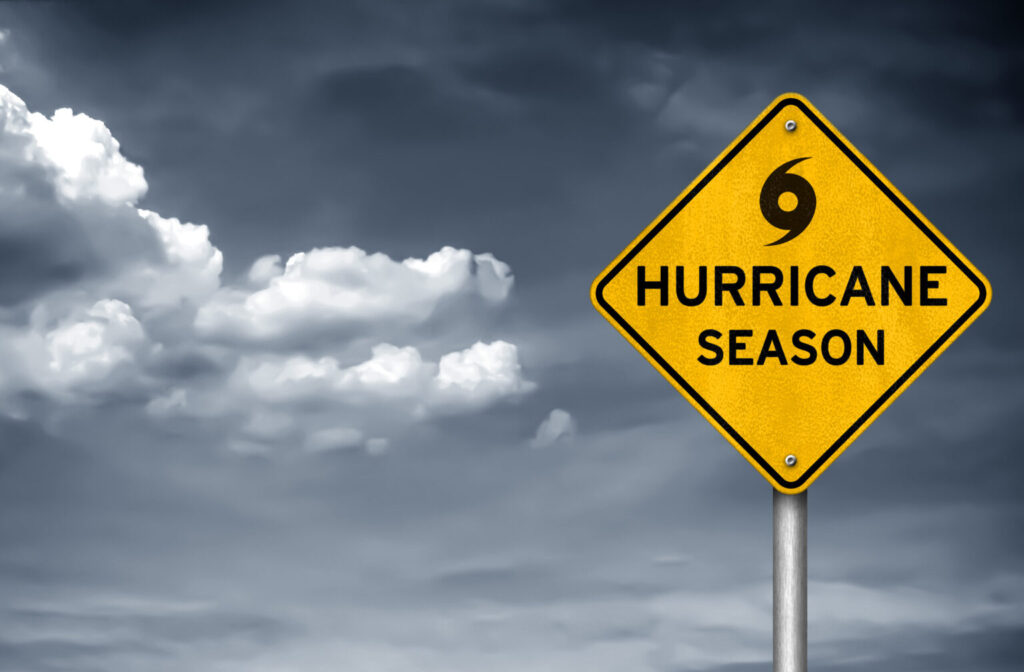 gguy - stock.adobe.com
gguy - stock.adobe.com When it comes to hurricanes, the 2022 season, which kicks off today, brings good news and bad news. The bad news? Forecasters predict another active season, and Hurricane Agatha already set an eastern Pacific record for the strongest hurricane to make landfall in the month of May when it struck Mexico.
The good news? Hurricane forecast models are more sophisticated than ever, making it possible to get out of harm’s way long before storms make landfall. It’s never easy to recover and rebuild after a powerful hurricane, but if you take the time to make a plan and secure essential supplies now, you can minimize the financial and emotional impact. Here’s a timeline of essential hurricane preparedness steps you can take now and in the days and hours leading up to the storm, courtesy of Satsuma realtor Buddy King.
Review your insurance policies
Review your insurance policies and make sure you have $250,000 in building replacement insurance coverage and $100,000 in content coverage. Flood damage is not included in most homeowner insurance policies, so now is the time to make sure you’re covered. Don’t hesitate, because once a storm is in the Gulf, insurance policies initiate a lockout period, King says—and you don’t want to run into a situation where you’re uninsured with a Category 5 storm bearing down on your home.
Assemble supplies
Again, you don’t want to be caught unprepared in a bad situation, with store shelves stripped of essentials. Beef up your nonperishable food and bottled water supplies, stock cabinets with candles, batteries, matches and prescription medications. Flashlights, battery- or solar-powered radios, power banks for charging devices like cell phones and laptops, and generators are useful things to have on hand. If you do have a generator, turn it on to make sure it’s in good working order, and stock up on gasoline and oil so you can keep it running.
Don’t forget about your furry friends, either. “We keep our pet food supplies high during hurricane season,” King said. “That way, if something happens and stores are closed, you have food to feed animals.” Plus, there’s no temptation to eat pet food—we can’t say the same about hurricane snacks.
Prepare your home and vehicle
A good rule of thumb—keep your vehicle road-trip ready, because hurricane season means you may take an impromptu cross-country drive at any moment. Fresh oil, a full tank of gas, air in the tires and a first aid kit in the trunk are essential.
”Keep your car in that state,” King said. “Gas lines get crazy, and you don’t want to sit in a line when you’re trying to get out of town.”
By the same token, now is the time to prune trees of branches that may fall on your house and clean out obvious debris from catch basins. If you notice standing water from obstructions you can’t reach, call 311 to report the blockage to the city and request cleaning.
Walk through your home and take a video of its contents so you have a dated reference point in case your property sustains damage during a storm. As you do so, create a checklist of precious items, like a photo album or piece of jewelry, “Have that list of can’t-lose items you’ll always bring with you in the event you leave,” King said. It’s much easier to refer to that list rather than try to remember everything when you’re already flustered.
Create an evacuation plan
Know where you’ll go in the event that a mandatory evacuation is issued, and touch base with friends and family to confirm you can stay with them should this happen.
A few days out
When a storm is bearing down, King takes care of last-minute tasks: he eats through the frozen food in his freezer so it does not spoil when the electricity goes out, he brings a tarp and a staple gun inside to quickly patch holes in the event of broken windows or roof damage; and he moves one of his cars to the upper levels of a parking garage to protect it from floodwaters. Now is also the time to pull cash out of ATMs, because many credit card machines don’t work when the power goes out. Secure patio furniture, trash cans or other outdoor objects that could become projectiles during high winds. Tune in to local news and follow official guidance. Finally, hit the road or batten down the hatches—and take some comfort knowing that you’ve done the work to prepare for the worst.